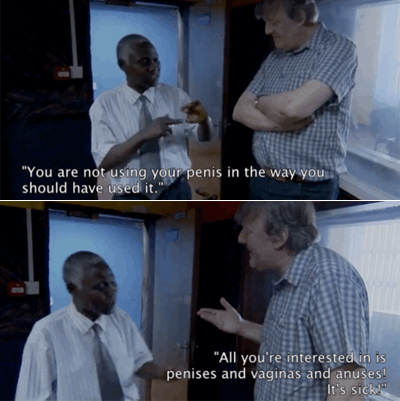
Stephen Fry (right) with Pastor Solomon Male of the Arising For Christ
Ministries who spoke very graphically about anal sex (22mins). Fry tells
him he never had anal sex and he and his partner prefer “fellatio
and mutual masturbation and intercrural sex such as the Greeks did.”
In the first of the 2-part documentary for BBC Two, Stephen reflects back on just how much has changed for gay people during his lifetime. He meets Elton John and David Furnish, the couple who inspired Stephen to be open about his sexuality as well as many others. This episode, Stephen travels to Uganda, where the government is considering a new law that would make homosexuality a capital crime - putting gay people to death for their sexuality.
Stephen meets the men and women targeted by this proposed law and finds out the impact it is already having on their lives. Stephen also travels to the USA to explore 'reparative therapy', which claims to offer a 'cure' for being gay. Whilst in the states, he looks at how Hollywood deals with the gay issue by talking to Neil Patrick Harris, an openly gay man who continues to land leading roles.
In the second part, Stephen visits Brazil, home to the largest gay pride celebration in the world and a place that has some of the best legislation on the planet for gay equality. But it has come at a price. All of the advances have brought about a violent backlash against gay people; on average, one gay person is murdered every 36 hours in Brazil. Stephen sees how this is impacting on the lives of gay men and women there and also confronts the politician leading the fight against gay rights.
Stephen also visits Russia, where gays are now worse off than they have been for a long time. Their rights are being constantly eroded by a conservative government, backed by the disapproval of the Russian Orthodox Church. Stephen then travels to India, where the old British laws that criminalised homosexuality have just been overturned. Modern India is now looking to Hindu traditions as it forges a more positive way forward for its gay citizens, including its once celebrated transgender community.
For interviews with Stephen Fry and director Fergus O'Brie, and related links, visit BBC Two: Stephen Fry: Out There.











 打印版本
打印版本
















读者回应
By the way, someone's put it up on youtube, probably without the BBC's permission.
http://www.youtube.com/watch?v=HCp_5-CsYuM
Mark Smith
Feature writer
Saturday 19 October 2013
The new two-part documentary, Stephen Fry:
Out There (Monday, BBC Two, 9pm) is about homophobia around the world, but Stephen Fry is not necessarily the best person to point out to other countries what they are doing wrong. There is too much of the British empire about him, too much of the colonial master who thinks he knows best. Well spoken and well armed with bons mots, he is like a gunboat that is a bit rusted and sagging and has been sent out do British business abroad.
Not surprisingly, some of the people he goes to see in other countries, particularly those that have only relatively recently shaken off colonial rule, resent the arrival of the British know-it-all. One of them, a government minister in Uganda, tells Fry to stop interfering in the affairs of his country, which on the face of it is a perfectly fair point. And then you realise this is Robert Mugabe's trick in Zimbabwe too - blame the old colonial power to distract attention from the behaviour of the colony.
In Uganda's case, the behaviour is disgusting: a blatant attempt by the government to make itself popular by telling lies about gay people. They are also considering a new law that would make homosexuality punishable by death and require every citizen to surrender to the authorities anyone they know to be gay within 24 hours.
As Fry found out, this has resulted in a part-sinister, part-hilarious culture in which government ministers promote the most ridiculous untruths. Particularly stupid was Simon Lokodo, the minister of integrity and ethics, who Fry deflated with great skill. Fry seems to have realised you can try to demolish a homophobe's arguments with facts, but, like someone who believes in creationism or crystal healing, they will cling to their faith. A much better strategy is to use humour to expose them - human rights usually change to the sound of laughter.
Some of the younger generation in Uganda are already doing this and openly mocking their leaders, but the danger is we forget to take the danger seriously and assume most of the world will continue its benign progress towards gay rights. Fry's point is that countries like Uganda, and Russia, are now at serious risk of going into reverse.
Even in Britain, says Fry, no assumptions should be made that all will be well. We do have the remarkable sight of a Tory Prime Minister fighting hard for gay marriage and survey after survey showing widespread acceptance of gay relationships as equal to heterosexual ones. But as Fry pointed out, gay rights are a remarkably recent achievement (in Scotland, for example, homosexuality was not decriminalised until 1980). And only the other day, a survey also found that one in six gay people have been the victim of a homophobic hate crime in the UK in the past three years. One in six. In supposedly progressive, lovely, understanding Britain. As Stephen Fry says, we must always be on our guard. Somebody out there hates us.
you must understand that Religions body is invasion.
it is robbery and they want to change rules over nations.
Religion using some kindness as cosmetic to attract follower
I love Stephen Fry, but this is really uncertain territory for him - he's great as the empathic listener, but needs to learn how to be a cold, uninvolved political interviewer.
Shouting down homophobes only plays into their hands.
请先登入再使用此功能。